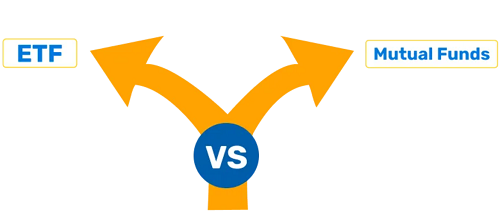When it comes to investing, two popular options are Exchange-Traded Funds (ETFs) and Mutual Funds. Both can help you grow your money, but they work in different ways. Understanding these differences is important for making smart investment choices. Here, we’ll break down what ETFs and mutual funds are, how they differ, and what you need to consider as an investor.
ETF Funds Vs Mutual Funds
What are mutual funds
Mutual funds pool money from many investors to buy a variety of stocks, bonds, or other securities. A professional manager oversees the fund and makes decisions about where to invest. Mutual funds are bought and sold at the end of the trading day at a price known as the Net Asset Value (NAV). This price reflects the total value of all the funds assets divided by the number of shares outstanding.
What are ETFs
Exchange-Traded Funds (ETFs) also pool money from multiple investors, but they are traded on stock exchanges like individual stocks. This means you can buy and sell ETFs throughout the trading day at market prices, which may differ from their NAV.
ETF funds can track specific indexes, such as the Nifty 50, or focus on specific sectors, commodities, or regions. This flexibility makes them a popular choice among investors looking to diversify their portfolios.
Key differences between ETFs and mutual funds
Trading and liquidity: ETFs provide real-time trading options on stock exchanges, making them very liquid. ETFs can be bought and sold throughout the trading day at current market prices. Additionally, ETFs have an indicative NAV (iNAV) that is updated frequently during the day. In contrast, mutual funds are valued at the end of the day based on their NAV, which might differ from intra-day prices.
Cost structure: ETFs generally have lower expense ratios because they are passively managed. On the other hand, actively managed mutual funds tend to have higher fees due to costs associated with research, analysis, distribution and management.
Investment approach: ETFs track a specific index, which offers transparency and reduced risk. In contrast, actively managed mutual funds rely on the decisions made by fund managers, which can potentially yield higher returns but also carry greater risk.
Investing process: To invest in an ETF, you need a DEMAT account. In comparison, mutual funds can be purchased through a mutual fund house, a distributor, or an aggregator.
Despite their different operational methods, ETFs and mutual funds share the common goal of providing investors with professionally managed, diversified investment options:
Diversified structure: Both ETFs and mutual funds give investors access to a diverse portfolio of assets, helping to spread risk across various holdings.
Professional management: Whether through the passive tracking of an index in ETFs or the active strategies of mutual fund managers, both investment vehicles benefit from the expertise of financial professionals.
Variety: There is a wide range of ETFs and mutual funds available, catering to various investor preferences.
Considerations for investors: Choosing between ETFs and mutual funds
Both ETFs and mutual funds come with their own unique benefits. ETFs might attract investors looking for low-cost, passive exposure to specific market segments, along with the ability to trade throughout the day. On the other hand, mutual funds may be suited for those who appreciate active management and aim to outperform benchmark indices over the long term.
ETFs: Flexibility and trading
ETFs provide investors with flexibility and the opportunity for real-time trading. If you value the ability to buy and sell during market hours to take advantage of price fluctuations, ETFs could be a great option. Additionally, their passive management style typically results in lower expense ratios, making them cost-effective for long-term investors.
Mutual Funds: Professional expertise and active management
Mutual funds, particularly actively managed ones, appeal to those who prefer to rely on professional fund managers to handle their investments. These experts use their market knowledge and insights to make informed buy and sell decisions on behalf of investors.
Your choice will ultimately depend on your financial goals, risk tolerance, investment horizon, and liquidity needs.
Risk tolerance: Actively managed mutual funds may carry higher risks in the pursuit of generating alpha (outperforming the benchmark index). Conversely, ETFs, with their passive strategy, might be more appropriate for those looking to align their investments with overall market trends.
Investment style: If you prefer real-time trading options, an ETF might be the better fit for you.
Conclusion
Both ETFs and mutual funds can be valuable tools for building your investment portfolio. Understanding their differences can help you make informed choices that align with your financial goals. Whether you choose ETFs, mutual funds, or a combination of both, the key is to stay informed and make decisions that suit your individual needs.
Mutual Fund investments are subject to market risks, read all scheme related documents carefully.





